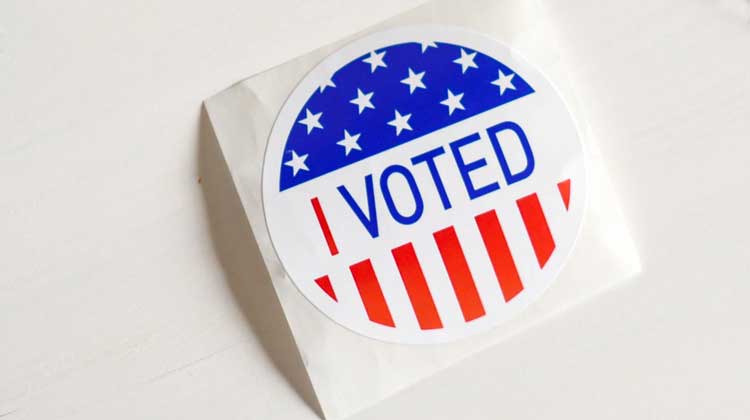
It was Election Day and the lines were as long as anyone could remember. Even longer. To be sure this was the age of advanced technology so in many places people could vote on their computers and iPhones and some pundits were predicting, surely in jest, that the age of the telepathic franchise wasn’t far away.
But not in South Carolina, which has always prided itself on doing things the old-fashioned way. In many places, such as here in Beaufort on the coast, they even still used paper ballots, since voting machines were seen as the beginning of the end of the human touch in the democratic process and who knows what else.
They had to check your name off too at the registration table at the high school and there was talk from some of the people walking out of the building that they were asking more questions than usual.
That was fine by John. He and his wife had come to South Carolina from up north to retire for the weather, of course, which meant 12 months of golf and sailing. (He didn’t fish.) But the state’s conservative attitudes – and here John prided himself on using conservative in the true sense – was a big part of the attraction as well.
So too was the friendliness. Cliché or not, most South Carolinians were as warm as their climate and so the 40 minutes John had to wait in line went swiftly. Somebody brought donuts. A second was handing out fried chicken. And it turned out that a woman in line about five back from John was on the condo board with his wife. That, at least, gave them something to talk about. It was also the reason why he hadn’t noticed perhaps as much as he should have how unhappy a lot of the people who were leaving were.
When he got to the table, an elderly Hispanic woman asked for his name and address. That business done, John headed to the line where the ballots were distributed.
“Uh, sir,” said the woman. “Not so fast.”
“Oh, I’m sorry,” said John. Since moving to South Carolina, he’d noticed he’d become more like the homegrown folks.
“Sir,” she continued. “You’ll need to see someone at that table over there in the back.”
By the time John was ready to object, the woman was on to the next voter so John headed to the table she had indicated and went though the whole name and address thing again. This registrar, a younger African-American man, looked up.
“Sir, there’s a note by your name,” he said. “You’re going to have to answer a few questions.”
“About what?”
“Who was the first Hispanic president of the United States?”
“You’ve got to be kidding. Everyone knows that. And what’s it got to do with voting?
“Next question: Name the last four vice-presidential nominees of the Republican Party before it dissolved.”
John knew three and he usually knew the fourth too but at the moment the name escaped him.
“Next question –.”
“Just wait a minute here. You have no right to be doing this. I can vote. Who’s in charge here?”
The black man got up and went inside a small office behind him. When he emerged a minute or two later, he was accompanied by what looked like a 25-year-old kid with an earring in his ear.
“How can I help you?” the kid said.
“You’re the person in charge?”
“I am indeed,” he answered. He shook John’s hand.
“Well,” began John and he went through the whole story – the wait, the initial registration, the trip to this table and those questions, and now this. The kid waited courteously until he had finished.
“Well, Mr. uh,” and it was clear he hadn’t learned John’s name. “Well sir, rules are rules. And you may not have been aware that the state has put in some new rules about elections.”
“New rules?”
“That’s right,” he said and then he lowered his voice. “We’re trying to keep some undesirables who don’t really know enough to be good citizens from diluting the franchise.”
John didn’t know what to say to that, at least not at first.
“Unfortunately the process snares some people it shouldn’t snare,” the kid continued. “Like you.”
“So how do I remedy that?”
“Well you can’t today. But any time after tomorrow, go down to the courthouse and see the Clerk and they’ll be able to help.”
“But the election’s today.” John turned around and began to notice that even though he didn’t want to say it out loud or even think it, all of the people being turned away were white like him.
He lowered his voice as the kid himself had earlier. “Can’t you see what’s going on? This isn’t legal.”
“I’m afraid it is sir. Decades ago the Supreme Court struck down a lot of the federal rules that pertain to voting. Said it was the job of the states to regulate voting. It didn’t have much effect then but now that –well how do I put it – mm, there ain’t as many white people as there used to be, well.” He gestured around the gym.
“I’m sure the Supreme Court said no such thing. Do you know who I am?”
No, the kid still didn’t know, which was kind of rude really. “Hmm, I’m afraid it did, Mister,” and the kid looked at the index card he was holding. “I’m afraid, Mr. John Roberts III, that it did. Now please excuse me. And by the way, the fourth Republican vice-presidential nominee you missed was Sarah Palin. If it makes you feel any better, that’s one a lot of people don’t get.”




Leave a Reply